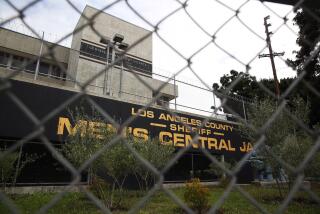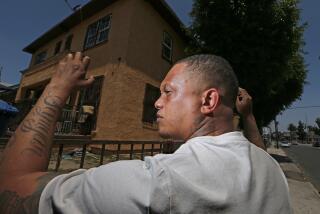Cameraman Describes King Beating - Trial: George Holliday’s videotape again is at the center of the case against four LAPD officers. The defense says the missing first minute of the incident is vital.
- Share via
When sirens and helicopters awakened him, an amateur cameraman threw on his pants, grabbed his video camera and raced to his patio, but about a minute elapsed before he began recording Rodney G. King’s beating by police, the cameraman testified Monday in Los Angeles.
That period before the tape begins has become central to the defense of four police officers accused of violating King’s civil rights. Attorneys for the officers claim King provoked his beating during that minute.
George Holliday, whose videotape is at the center of the federal trial of the four officers, said everything he saw of the beating is on his nine-minute videotape.
But he recalled that moments before he began filming, he looked out his window and “I saw a white car that had been stopped. I saw a black man who was spread-eagled on the car . . . his feet spread apart and his hands on top of the car.”
Holliday, 33, took the stand as federal prosecutors opened their second week of testimony, focusing jurors’ attention on the videotape.
Officers Laurence M. Powell, Theodore J. Briseno, former officer Timothy E. Wind and Sgt. Stacey C. Koon are accused of violating King’s civil rights when he was clubbed, kicked and stomped after a car chase.
The videotape was shown to jurors at its full length in its original version and after enhancement by an expert who tried to make some of the blurry scenes clearer. The expert said his efforts failed, and for that reason, portions of the tape remain open to interpretation.
Holliday, who also testified in the officers’ state trial, said he awoke after midnight on March 3, 1991, when he heard the sirens and a helicopter hovering near his apartment.
“I had bought a video camera about two weeks before,” he recalled. He said he ran to the living room, unplugged the camera’s charger, removed the camera from a tripod and ran outside with it.
After a delay of about a minute, he began filming the beating, Holliday said. He said he stopped filming and went back inside “because it was cold and I didn’t have a shirt on.” Holliday said he went back to bed and waited until two days later to telephone police. He said he then called a television station and sold the tape to the station for $500. The tape ultimately was broadcast worldwide.
On Friday, two civilian witnesses told jurors that King never tried to strike the officers. One of the witnesses said King pleaded with the officers to stop beating him.
“He was just dodging blows. He was on the ground. It sounded like I heard him scream out: ‘Please stop!’ ” said Dorothy Gibson, a registered nurse who lived across the street from where the beating occurred.
Last spring, the officers were acquitted of brutality charges in state court. The verdicts touched off riots that left more than 50 people dead and caused $1 billion in damage.
The four could get up to 10 years in prison and $250,000 in fines each if convicted on the civil rights charges.
More to Read
Sign up for Essential California
The most important California stories and recommendations in your inbox every morning.
You may occasionally receive promotional content from the Los Angeles Times.













